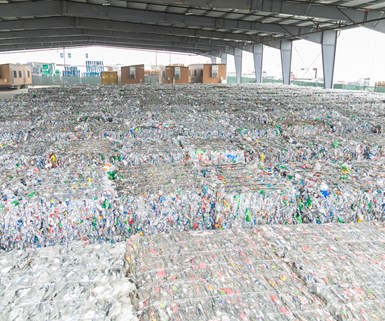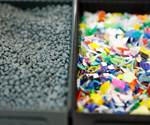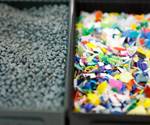U.S. Energy Department and American Chemistry Council to Collaborate on Plastics Recycling
The MOU serves as a framework for the U.S. Department of Energy and ACC to collaborate on the development of innovative plastics recycling technologies and strengthen the domestic plastics supply chain.
The U.S. Department of Energy (DOE) and the American Chemistry Council (ACC) signed a Memorandum of Understanding (MOU) to enhance technology in plastics recycling and reduce waste through enhanced recovery of post-use plastics.

Image from rPlanet Earth May 2019 OnSite article.
The MOU serves as a framework for DOE and ACC to collaborate on the development of innovative plastics recycling technologies and strengthen the domestic plastics supply chain. Key technical areas of collaboration include developing novel collection technologies to prevent plastics from entering waterways; developing approaches for mechanical and chemical deconstruction of post-use plastics into useful chemical building blocks for upgrading into higher-value products; and developing new polymers that are inherently designed for recycling.
“Through this partnership with the American Chemistry Council, the Department of Energy is furthering its mission to spur American innovation and leadership in energy efficient recycling technologies and the manufacture of new plastics that are recyclable by design to reduce plastic waste in our rivers, oceans, and landfills," said Under Secretary of Energy Mark W. Menezes. “The department recognizes that it will take collaboration across the value chain, and we look forward to working with the American Chemistry Council and other stakeholders to advance DOE's Plastics Innovation Challenge."
“Plastics play a significant role in reducing energy use, greenhouse gas emissions and waste, but we must do more to end post-use waste through greater expansion of innovative recycling technologies,” said ACC President and CEO Chris Jahn.
In 2018, ACC announced goals to reuse, recycle or recover all plastic packaging in the U.S. by 2040.
This partnership advances announced late last year. The Plastics Innovation Challenge draws on departmental resources and applied research at the National Laboratories to accelerate energy efficient technologies that reduce plastic waste in oceans and landfills.
As part of the challenge, the Office of Energy Efficiency and Renewable Energy (EERE) plans to issue a funding opportunity announcement for bio-optimized technologies to keep thermoplastics out of landfills and the environment, which would include potential topics on highly recyclable or biodegradable plastics and novel methods for deconstructing and upcycling plastic waste. As another example, in November 2019, the Office of Science issued a funding opportunity announcement for Energy Frontier Research Centers, which included a call for multi-disciplinary proposals to develop the scientific understanding and innovation necessary for chemical upcycling of plastics.
Related Content
-
Robotic Sorters With AI Technology Deployed in Fresno Recycling Center
A grant from the Recycling Partnership enabled Implementation of RecycleOS Technology from Everest Labs.
-
PET Chemical Recycling Process Qualified and Commercialized
Process will be offered as a license package globally by Axens.
-
Neste, Borealis and Covestro Plan to Make Polycarbonate From Recycled Tires
Companies announced agreement that will use advanced recycling to convert old tires into new PC-suitable for automotive applications.






